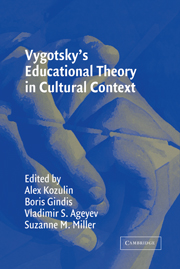Book contents
- Frontmatter
- Contents
- List of Contributors
- Series Foreword
- Introduction: Sociocultural Theory and Education: Students, Teachers, and Knowledge
- PART I CONCEPTS AND PARADIGMS
- PART II DEVELOPMENT AND LEARNING
- 6 Periods in Child Development
- 7 Development Through the Lifespan
- 8 Learning and Development of Preschool Children from the Vygotskian Perspective
- 9 The Learning Activity in the First Years of Schooling
- 10 Remediation Through Educationw
- PART III SOCIOCULTURAL THEORY APPLICATION IN THE CLASSROOM
- PART IV DIVERSE LEARNERS AND CONTEXTS OF EDUCATION
- Author Index
- Subject Index
- Titles in the series
- References
6 - Periods in Child Development
Vygotsky's Perspective
Published online by Cambridge University Press: 05 June 2012
- Frontmatter
- Contents
- List of Contributors
- Series Foreword
- Introduction: Sociocultural Theory and Education: Students, Teachers, and Knowledge
- PART I CONCEPTS AND PARADIGMS
- PART II DEVELOPMENT AND LEARNING
- 6 Periods in Child Development
- 7 Development Through the Lifespan
- 8 Learning and Development of Preschool Children from the Vygotskian Perspective
- 9 The Learning Activity in the First Years of Schooling
- 10 Remediation Through Educationw
- PART III SOCIOCULTURAL THEORY APPLICATION IN THE CLASSROOM
- PART IV DIVERSE LEARNERS AND CONTEXTS OF EDUCATION
- Author Index
- Subject Index
- Titles in the series
- References
Summary
Smiles and coos of recognition; tentative first steps and first words; communicating and making sense of the world; anxious excitement on the first day of school; awareness of others; conceptual thinking; awareness of self; and the transition to young adulthood: As parents and teachers, we marvel at children's myriad journeys. At times, we experience frustration when we witness profound, often unsettling, changes in children's behavior and interactions with others. During these difficult times, such as the “terrible twos” or the “dreaded” adolescent years, children often seem to take on different personalities. How and why, we wonder, does this occur?
The same question fascinated Lev Vygotsky and was at the center of his theory of child development. He went further, asking what these times of crisis, or critical periods as he called them, demonstrate about the patterns and processes of children's mental and social functioning. The answers he developed are helpful today for educators trying to shape educational opportunities that meet the needs of all children. This chapter focuses on Vygotsky's analysis of the relationship between children's individual growth and development and the sociocultural situations into which they are born.
- Type
- Chapter
- Information
- Vygotsky's Educational Theory in Cultural Context , pp. 119 - 137Publisher: Cambridge University PressPrint publication year: 2003
References
- 18
- Cited by

